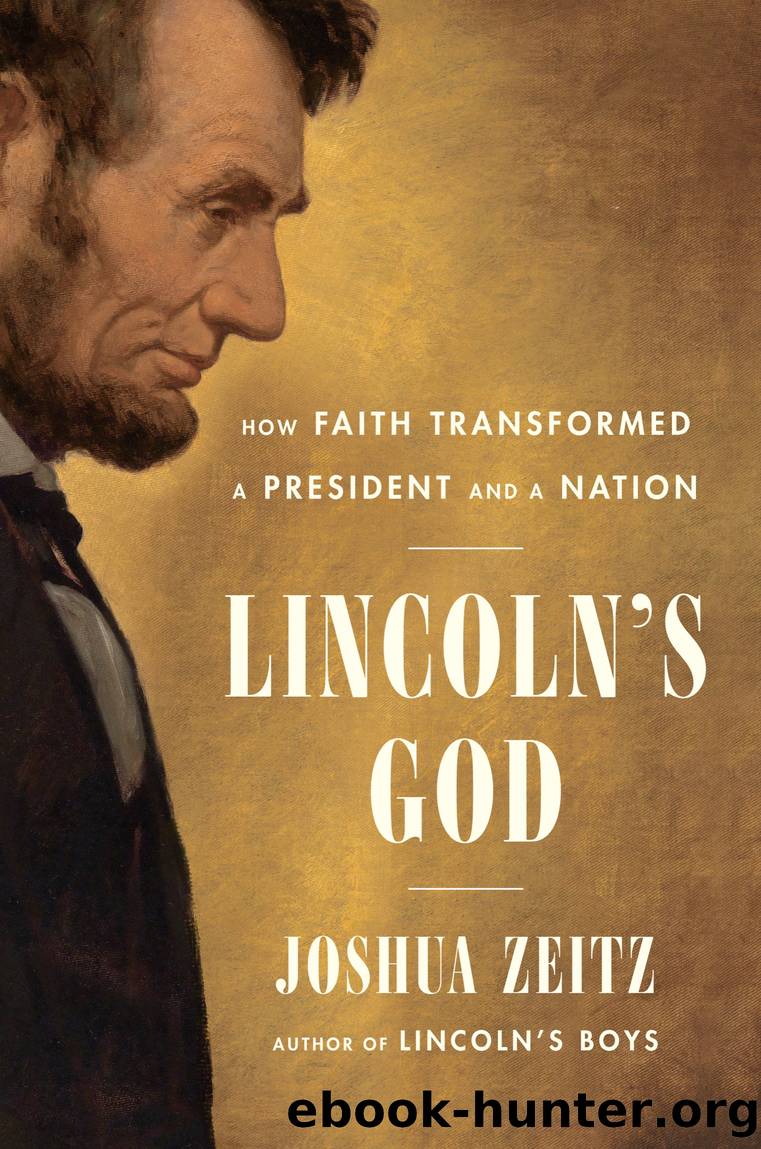Lincoln's God by Joshua Zeitz

Author:Joshua Zeitz [Zeitz, Joshua]
Language: eng
Format: epub
Publisher: Penguin Publishing Group
Published: 2023-05-16T00:00:00+00:00
* * *
As he grew more religious, Lincoln did not share in his countrymenâs conviction that a more personal God would reward the Union and punish the Confederacy. God remained, for him, a more abstract and unknowable force. That did not make him any less a believer. Try as he might over his lifetime to snap free of his fatherâs faith and fatalism, during the war, Lincoln traveled a road back to a subtle form of predestinarianism, even as most evangelical Protestants continued to walk away from it. He likely did not believe that people were born among the elect or not, but he believed God had a plan that men and women were powerless to alter. âI am of the opinion that there was a slight tinge of fatalism in Mr. Lincolnâs composition which would or might have led him to believe somewhat in destiny,â a friend, Joseph Gillespie, later wrote. âMr. Lincoln once told me that he could not avoid believing in predestination although he considered it a very unprofitable field of speculation because it was hard to reconcile that belief with responsibility for oneâs act.â Lincoln was âa fatalist,â offered one of his former law clerks, Henry Clay Whitney, who remained close to him during his presidency. He was fond of quoting Shakespeareâs Hamlet, in which the title character tells Horatio, âThereâs a divinity that shapes our ends, / Rough-hew them how we will.â
Mary Todd Lincoln, who migrated from the Episcopalian to the Presbyterian church during her days in Springfield and Washington, DC, would later observe that her husband believed that âwhat is to be will be, and no cares of ours can arrest nor reverse the decree.â It was perhaps one of the only subjects on which she and William Herndon agreed. His former law partner, he remembered, had long felt that âthings were to be, and they came, irresistibly came, doomed to come; men were made as they are made by superior conditions over which they had no control; the fates settled things as by the doom of the powers, and laws, universal, absolute, and eternal, ruled the universe of matter and mind. . . . [Man] is simply a simple tool, a mere cog in the wheel, a part, a small part, of this vast iron machine, that strikes and cuts, grinds and mashes, all things, including man, that resist it.â
In a letter to Eliza Gurney, a Quaker activist whom he came to know during the war, the president offered that the âpurposes of the Almighty are perfect, and must prevail, though we erring mortals may fail to accurately perceive them in advance.â Lincoln never shared the personal relationship with God in Christ that most of his coreligionists felt. His was a distant and unknowable God whose will was imperceptible to men and women. âWe hoped for a happy termination of this terrible war long before this,â he continued, âbut God knows best, and has ruled otherwise. We shall yet acknowledge His wisdom and our own error therein.
Download
This site does not store any files on its server. We only index and link to content provided by other sites. Please contact the content providers to delete copyright contents if any and email us, we'll remove relevant links or contents immediately.
| ASVAB | GED |
| GRE | NCLEX |
| PRAXIS | SAT |
| See more | Flash Cards |
| Study Guides | Study Skills |
| Workbooks |
Talking to Strangers by Malcolm Gladwell(13370)
The Compound Effect by Darren Hardy(8969)
Tools of Titans by Timothy Ferriss(8396)
Wonder by R. J. Palacio(8113)
The Lover by Duras Marguerite(7903)
A Court of Wings and Ruin by Sarah J. Maas(7848)
The Circle by Dave Eggers(7115)
Deep Work by Cal Newport(7085)
Kaplan MCAT General Chemistry Review by Kaplan(6934)
To All the Boys I've Loved Before by Jenny Han(5851)
Wiseguy by Nicholas Pileggi(5787)
The Body: A Guide for Occupants by Bill Bryson(5098)
Eat That Frog! by Brian Tracy(4541)
1,001 ASVAB Practice Questions For Dummies by Powers Rod(4509)
Cracking the GRE Premium Edition with 6 Practice Tests, 2015 (Graduate School Test Preparation) by Princeton Review(4294)
Pre-Suasion: A Revolutionary Way to Influence and Persuade by Robert Cialdini(4233)
Barron's AP Biology by Goldberg M.S. Deborah T(4150)
ACT Math For Dummies by Zegarelli Mark(4049)
Alive: The Story of the Andes Survivors by Piers Paul Read(4033)
